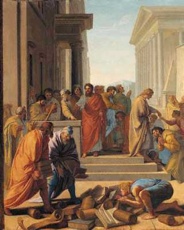How they did it

In the first century, if you had a church in your neighbourhood chances are:
- You lived in a port city.
- You lived in a port city that was Greek in language and culture.
- You lived in a port city that was Greek in language and culture and had a Jewish community.
Q. Why a port city?
A. Easy access.
Q. Why Greek?
A. More responsive to the gospel than Roman culture.
Q. Why Jewish?
A. Networks of relationships with existing Christians and more responsive to the gospel.
Paul's mission was to reach the Gentiles. How did he do it? By reaching Jews in Gentile cities.
According to Rodney Stark, nearly all of his efforts took place within Diasporan Jewish communities. Except for Luke most of his entourage was Jewish. He was welcomed by Jews. He preached in Jewish homes and in the synagogues. And most of those greeted in his letters seem to have been Jews.
Hellenist Jews were the most responsive people in the empire to the gospel. They had tenuous ties to their traditional faith and were open to new ideas.
That's why you find Paul in port cities, with a Greek culture, reaching Hellenistic Jews. They became the beachhead through whom the gospel spread in depth the wider population.
What was true for Paul was also true of the great mass of rank-and-file Christians who took the gospel to the empire. Social networks led Christians to missionize the Hellenized Jews of the Diasporia.
Stark again:
For missionaries headed out from Jerusalem, the pressing first questions were, Where should we go? Who would receive us? The answer seemed obvious. All across the Greco-Roman world were relatively well-to-do communities of people to whom the missionaries had ties—people who were relatives (even if very distant), or friends of friends.
Q. So where are the beachheads in the world/s you're trying to reach?
A. [Fill in the blank]
